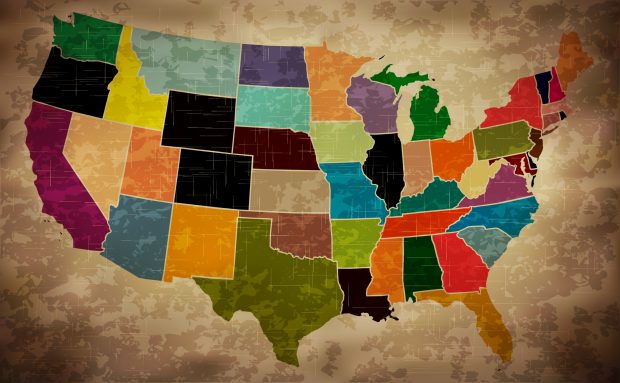 Source: Shutterstock.
Source: Shutterstock.
States possess what are called "reserved powers." These are political powers that are neither prohibited nor explicitly given by law to any institution of government. According to the Tenth Amendment in the United States Constitution, states have the right to govern themselves, in squishy legally-defining terms, in areas that the federal government doesn't have time to deal with because it's impractical for the federal government institution to enforce every little thing states do. It's like a mutually agreed upon way of doing business: You do your thing and I'll do mine, and if there's a problem, I'll let you know.
All sides of the political parties invoke the marching orders of states' rights when federal law clashes against some kind of ideological goal of politicians. Sometimes the voters jump into the argument, but many examples I've read about involve politicians raising some version of hell when they feel like the federal government has gone too far or not far enough on whatever issue appears to be important at the moment.
The decriminalization of marijuana, for example, is a popular topic for elected federal officials to take a stand on. Some elected officials want to crack down on states that have legalized marijuana. Other officials want to change the federal laws so that the states versus the feds fight will end.
It's the same fight we've seen with same-sex marriage, abortion, flying the Confederate flag and Obamacare. Reconciliation of those issues either come out of the Supreme Court, or one side or the other tends to poop out and tire of the fight for the time being – until the next election campaign cycle.
Right now, in real time, we are watching a very unique fight between the Trump Administration and 22 states. The fight concerns states' rights to establish stricter emissions rules that were granted under the Clean Air Act of 2013. In it, states were allowed to develop and enforce their own standards to help reduce emissions caused by gas-powered vehicles. Historically, the Environmental Protection Agency granted states waivers to create those standards.
Just recently, President Trump decided to revoke those Clean Air Act waivers because, according to his Twitter posts, he believes stricter environmental rules will result in vehicles that are not as safe.
"The Trump Administration is revoking California's Federal Wavier on emissions in order to produce far less expensive cars for the consumer, while at the same time making the cars substantially SAFER." He continued tweeting about his changes that would create "extremely environmentally friendly" cars as well as increase auto production, which means "JOBS, JOBS JOBS."
You know, when someone says something three times in all caps, it must be true. If that rule doesn't apply, then that means I never felt "HOT, HOT, HOT" according to Buster Poindexter's 1980s hit.
Of course, we have to ask: Is this revoking of the Clean Air Act waivers for states a political move? Or is this a simple good-business move that the president is deciding is best for the United States of America?
I've been thinking through this scenario between the president and 22 states from my perspective, but I've also been looking through a marijuana banking-related lens. And it was a jolt of a reminder that at any moment, for political or personal or good-business reasons, the Trump administration could in fact shut down any and all marijuana banking practices that have been working very well for credit unions in those states where marijuana businesses are legal – but only at the state level.
As of this writing, the House is expected to take up a significant vote in the marijuana banking legislation process: H.R. 1595. This bill would officially provide a safe harbor for financial institutions that provide banking services to marijuana-related businesses.
The bill has been massaged in a few places to make it more palatable to Republicans in the House and Senate, whose members have been against the federal government legalizing hardly anything marijuana-related.
Many lawmakers would rather follow the states' lead on the issue to help draft a full-blown federal law to remove these financial regulatory hurdles. Many lawmakers would rather not take that kind of a stand, especially in this new election cycle. Fix it all now? Fix part of it? Fix none of it? Or wait for the president to announce a new anti-marijuana policy on Twitter and order the Drug Enforcement Agency, FBI and Homeland Security agents to raid any financial institution doing business with marijuana businesses?
It's not unrealistic that this last option would happen. It's happened with immigration policies, the United States withdrawing from the Paris Agreement and states' rights to establish their own emission standards under the Clean Air Act.
Can the NCUA provide some security and/or cover to those credit unions who are out on the front lines of the marijuana banking issue? Or is this an issue where state and regional credit union leagues can help out?
Looking to those organizations for assistance won't solve the problem. I agree that states should be making those "close-to-home" decisions that best reflect the wants and needs of the citizens of those particular states. And the federal government needs to follow the lead of these states to create a solid set of federal guidelines to help our credit unions grow and prosper without worrying that a tweet could come at any minute and end it all.
A Final Note
Most of this summer I was working remotely from my parents' house in Massachusetts. The reason for this was because my mom was in the final phase of her life after nearly two and a half years of treatments, surgeries and struggles with Stage 4 ovarian cancer.
During those several weeks, I was helping my dad fulfill her wish to die at home. She made it very clear that she did not want to go back to the hospital. With help from the kind people from VNA Hospice Care, we all did our best to keep the pain at bay and keep her as comfortable as we could.
 Rosemary Steele, Rosie-in-Chief
Rosemary Steele, Rosie-in-ChiefBefore she was unable to speak any longer, I learned so much about her and my dad that has inspired me and made me hopeful about many things in life. I love her very much and one of the last things she whispered to me was, "I will try and show you how much I miss you."
Her name was Rosemary and she left us on Sept. 13, 2019.
Michael Ogden is editor-in-chief for CU Times. He can be reached at [email protected].
© Touchpoint Markets, All Rights Reserved. Request academic re-use from www.copyright.com. All other uses, submit a request to [email protected]. For more inforrmation visit Asset & Logo Licensing.







